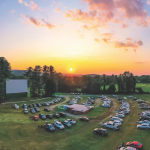
The Country Music Association’s CMA Touring Awards, which took place on Jan. 21 at Nashville’s Marathon Music Works venue, were very much like the touring productions they celebrate: precise, well-executed and tight. The event began within 10 minutes of its 7 p.m. announced downbeat and its 15 categories — including FOH and monitor mixers of the year — were concisely wrapped less than 90 minutes later. Substitute a bus for the post-show bar, and everyone would have been en route to the next gig by 10 p.m.
Nominees and winners included, for FOH engineer of the Year, Jared Blumenberg (Florida Georgia Line), Billy Moore (Eric Church), Chris Rabold (Kenny Chesney), Arpad Sayko (Chris Stapleton) and Ian Zorbaugh (Old Dominion). Monitor Engineer of the Year nominees included Bryan “Opie” Baxley (Kenny Chesney), Wesley Crowe (Thomas Rhett), Stuart Delk (Rascal Flatts), Marc Earp (Eric Church) and Scott Tatter (Dierks Bentley).
The balloting format is familiar — CMA members in the following membership groups are eligible to vote on the 15 categories up for awards: Advertising/Public Relations/Media, Affiliated, Artist, Entertainment Services, Marketing/Digital, Musician, Personal Manager, Record Label, Talent Agent, Talent Buyer/Promoter, Touring and Venue. Each category contains five nominees.
The Oscars and the Grammy Awards could take a lesson from how this show moves along. Few winners came to the stage with prepared speeches, all spoke from the heart, a couple came close to tears of thanks and genuine surprise, Jesus and spouses were liberally invoked — this is country music, after all. Notably, most winners generously credited colleagues for their success, such as Chris Stapleton’s FOH engineer Arpad Sayko, who thanked his counterpart at monitors “on the other end of the snake.”
A Small Group
What is surprising, though, is the relative narrowness of the list over the eight years that the touring awards have taken place. Nominees frequently reappear in key categories, but nowhere nearly as often as the artists they work with. Over the last several years, Eric Church, Kenny Chesney, Florida Georgia Line, Luke Bryan, Chris Stapleton and a handful of others are on almost every list, multiple times. It’s not unexpected — all are big repeaters on Pollstar’s year-end charts. But overlooked this year and others were newer artists like Luke Combs, Dustin Lynch or Cody Johnson, or female artists like Kaycey Musgraves, Kelsea Ballerini, Cassadee Pope, and this year’s Grammy Award winner Tanya Tucker, among others, all of whom were on the road last year. (Maren Morris just made it — her guitarist, Bennett Lewis, was nominated for Touring Musician of the Year, the final category of the night.) Considering that technical crewmembers will often stay with some artists for years, tour after tour, that further limits the pool of nominees.
I asked the CMA rep about that and was told that, “CMA Touring Awards nominations are based on individual talent of the nominees, not the merit of or affiliation with any particular artists,” and “Members may write in any name they wish.” Looking at the list of nominees and artists over the last few years, though, it would seem like a feedback loop is being created, with an inherently limited array of nominees, considering the scores of country artists who tour each year.
That could be a function of Nashville’s own insular business community — many of the same management firms and talent agencies are also repeat contenders, such as Maverick and Q Prime South, and CAA and WME. And let’s face it, we are down to three major labels (four in Nashville, if you count Big Machine, home to FGL and Rascal Flatts), which also tends to keep diversity down. And the repeat performers on the touring list are also regulars on country radio, the genre’s longtime gatekeeper, which has been notoriously stingy when it comes to indie and female artists. (A 2019 study of Mediabase country chart data found a 66-percent decline in women’s airplay between 2000 and 2018. Kenny Chesney — the top-played male artist in that period — earned nearly twice the spins of Carrie Underwood, the top-played female.)
Greater Awareness Needed
This isn’t a criticism of the purpose of the CMA Touring Awards, or the execution of its event. Like the Parnelli Awards and TEC Awards, they pull back the curtain on the engine room of music production, honoring the amalgamation of highly specific skills that keep live music — country music, in particular — on the road. And touring is a big piece of what sets country touring apart — country artists were relying on live shows for connection to their audiences and to pay the mortgage long before the mainstream music world figured out what to do when recorded music began to tank almost two decades ago. Country music taught the larger music industry about the nuances of the tour business, and it’s why Nashville is ground zero for so many tour productions of all genres — it’s where the musicians, the technicians, the creatives, the set builders, the buses and the bus drivers (who are also a touring-awards category) all are.
There’s so much more to be celebrated under this rubric, but country music and Nashville tend to keep their bus in the middle lane, embracing the familiar over all else. Even the touring awards’ Venue of the Year category seems frozen in aspic, with Nashville’s Bridgestone Arena and Ascend Amphitheater (and, oddly, the Bank of New Hampshire Pavilion in Gilford, NH) appearing on the list year after year, despite a decade in which dozens of new and adventurous music spaces opened, like the Anthem in Washington, D.C. and the Mission Ballroom in Denver.
The CMA Touring Awards recognize excellence in some of music touring’s most critical roles (and I’m sorry to see they dropped the Tour Caterer of the Year category this year). But the culture around music production has changed, as has the world. More and different artists would bring in a much wider and welcomed array of mixers, designers and techs, all of whom would love to have the acknowledgement of the CMA which, despite its tendency towards cultural calcification, is still the club people want to belong to in country music.
It’s time to let more of them in.



